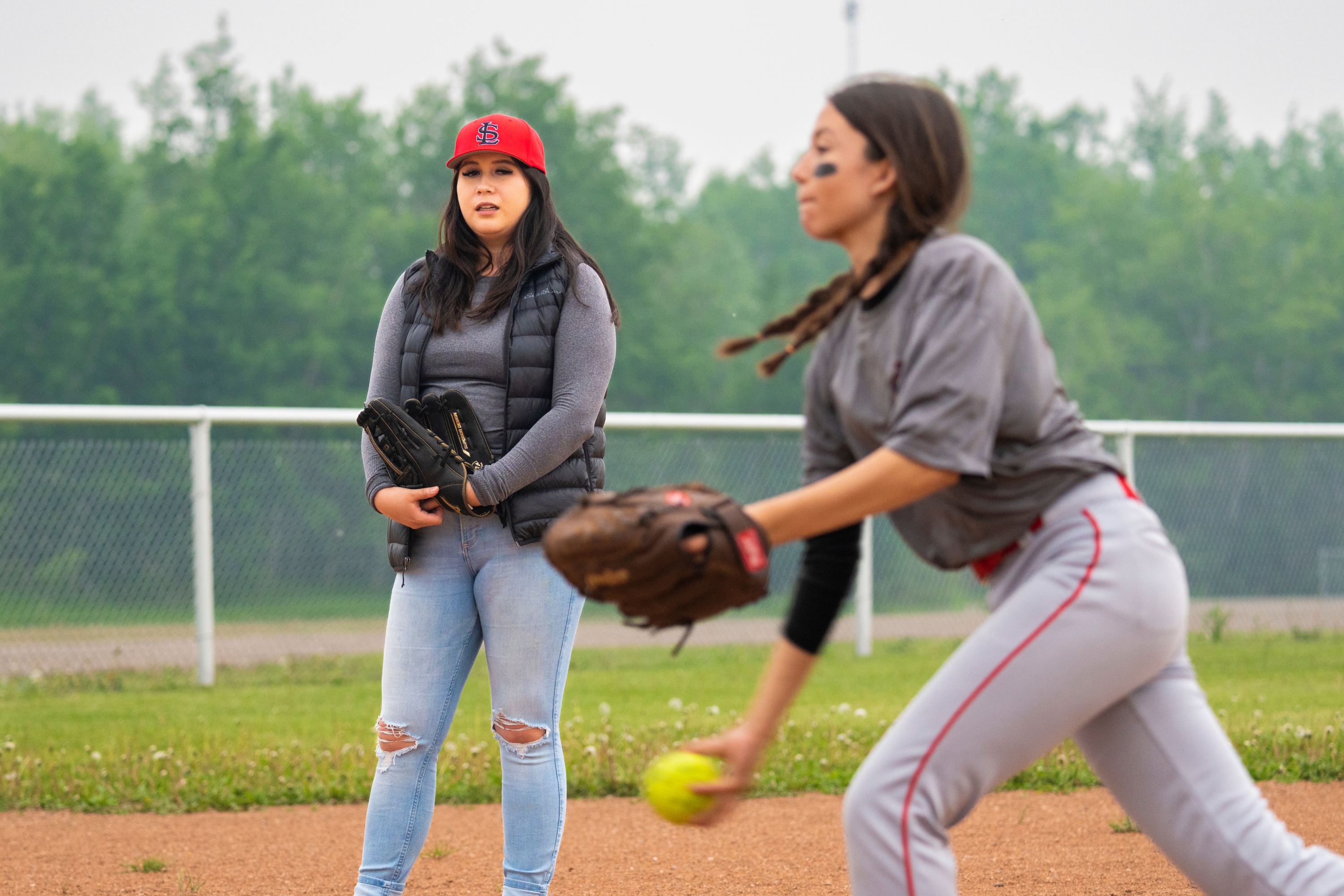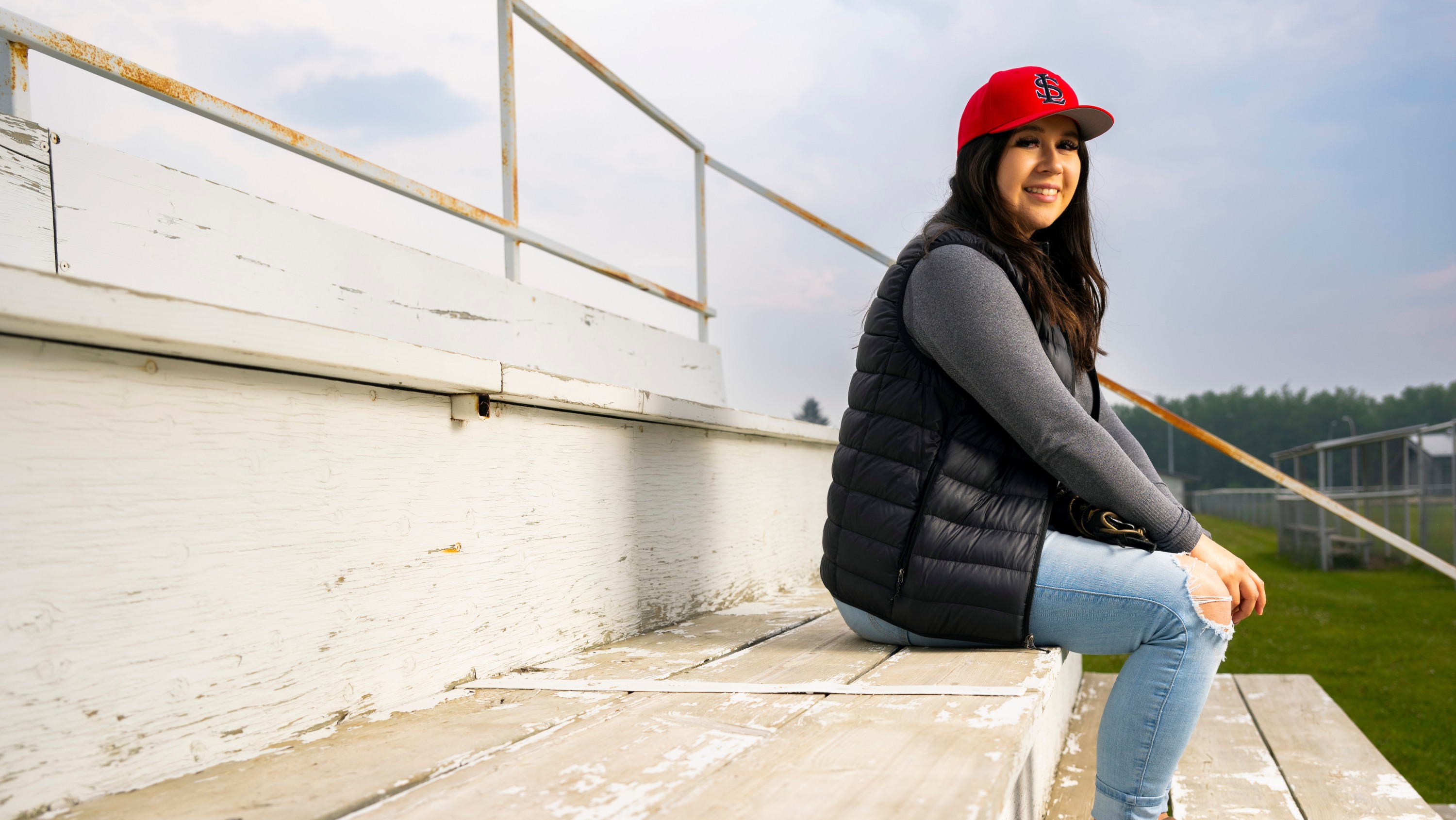Alyssa Ermineskin’s parents felt strongly about their children having the chance to participate in sports, even if it meant financial sacrifices or extra travel from their home in the Ermineskin Cree Nation in Maskwacis to nearby towns.
But Ermineskin was aware that many of the kids around her didn’t have the same opportunities, with barriers — like a lack of transportation or an inability to pay for registration fees and uniforms — preventing their participation.
That’s a reality she’s determined to change, and the recent Bachelor of Arts in Recreation, Sport, and Tourism (BARST) graduate from the Faculty of Kinesiology, Sport, and Recreation is already getting started in the Saddle Lake Cree First Nation northeast of Edmonton, where she currently lives.
“Everything I’ve learned in university, I want to bring back to an Indigenous community. I want to be able to bring more accessible sport opportunities and recreational programs to communities, and specifically Indigenous youth” says Ermineskin.
Though she clearly now knows her passion and purpose, when Ermineskin first entered university, she wasn’t quite sure what path she wanted to pursue. The Transition Year Program was a valuable resource, allowing her to explore various options through a year of open studies until she found the right fit, Ermineskin explains. And, though others within her program came from different areas, their shared Indigenous background helped create a sense of community on campus.
“It felt like home away from home,” says Ermineskin, who was born in Maskwacis. “Although it was an extra year added to my program, I still wouldn’t have done it any other way.”
Ermineskin credits Suzanne Butler, associate director of the Transition Year Program, for showing the way toward the BARST program, where she thrived.
According to Butler, helping guide students in this way is one of the best parts of her role. “So often, these students in our program are so committed to giving back,” says Butler. “They come to university because they want to make improvements in their communities, they want to go home and make positive change. So, I will do everything I can to help facilitate that and support the students in that because I think that’s incredible.”
Once Ermineskin had a clear vision of what she wanted to achieve with her degree, she also opted to earn a certificate in Indigenous sport and recreation.
“I wanted [the certificate] to be an asset to community members of Indigenous reserves, non-Indigenous people, and chief and council,” says Ermineskin. “I made that decision to keep my Indigenous background with my studies and wanted that to be intertwined with what I learned in university.”
With a goal to make an impact in an Indigenous community, Ermineskin worked with the faculty to create a personalized practicum in Saddle Lake during her final year.
“Saddle Lake was in the process of introducing their recreation program back into the community when I began my practicum,” says Ermineskin. “Me and Mitch Makokis [her supervisor] had to really work from the ground up to be successful. We both had to step up our game, be professional and put ourselves out there.”
Working with Makokis, she established several programs and recreation nights in the community.

“It’s really personal to be able to help specifically Indigenous kids. I want to make sure they’re having the same opportunities as everybody else,” says Alyssa Ermineskin.
And the offerings continue to grow. The 14-week practicum was such a success that Saddle Lake turned it into a permanent role, with Ermineskin starting work as a recreation assistant after graduation.
Ermineskin faced her fair share of challenges during the course of her studies, including adjusting to life as a new parent, particularly when COVID-19 rendered child-care options virtually nonexistent for a period. The switch to remote learning during COVID ended up being a blessing in disguise, allowing her the flexibility needed to balance her studies with caring for her son, Oakland.
“After COVID and after having my baby I really buckled down. I thought, I have to take this seriously and be focused on my degree requirements because I want to keep doing this for the rest of my life and be a positive role model for my son,” says Ermineskin.
The hard work didn’t go unnoticed by Butler. “She went through a lot to finish her degree,” Butler says. “It just shows her resiliency and determination. I’ve always just really admired her for that.”
Ermineskin brings a unique combination of lived experience and academic knowledge to the community she serves.
Her degree and certification mean she has the expertise to implement and manage programs, building them from the ground up and ensuring they run smoothly.
But her childhood experiences, including recognizing the barriers faced by kids and families around her, give her the ability to identify where additional support may be needed.
For example, Ermineskin obtained sponsorships to fund youth participation in the Alberta Native Hockey Provincials. Participants had their accommodations covered, meal money, plus travel and daily player incentives to ease any financial burdens. As a result, her efforts meant nearly triple the usual number of children were able to participate in the tournament.
“It was really successful and a lot of parents congratulated both me and Mitch on the support they were given,” she says.
One successful tournament is just the beginning, though. Ermineskin has big plans for Saddle Lake’s recreation offerings. For example, she and Makokis were able to start a baseball league in Saddle Lake — for the first time in over 30 years, youth can represent their home community and play right in Saddle Lake rather than having to travel to nearby St. Paul, something for which many parents have expressed their appreciation and excitement.
In addition to creating programs that target different ages and sports, she’s also trying to implement complementary offerings, such as lunch and snack programs in the summer months and workshops led by elders.
“I want to be able to offer programs that are accessible to them so they feel they’re being supported and they don’t have to worry about money, transportation to and from home, equipment, or food.”
Ermineskin’s own son, now three, is one of the participants enrolled in some of Saddle Lake’s programs. She’s following in her parents’ footsteps, making sure Oakland has the chance to try out whatever sports catch his interest.
As the community’s programming continues to develop and evolve, Ermineskin is fuelled by her determination to ensure no children are left sitting on the sidelines, a phenomenon she saw far too often growing up.
“It’s really personal to be able to help specifically Indigenous kids. I want to make sure they’re having the same opportunities as everybody else.”
